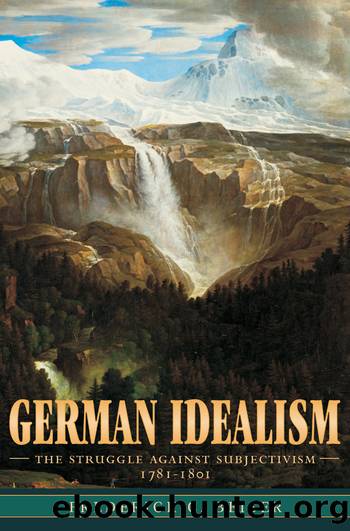German Idealism by BEISER Frederick C

Author:BEISER, Frederick C. [Beiser, Frederick C.]
Language: eng
Format: epub
Publisher: Harvard University Press
CHAPTER 2
* * *
Hölderlin and Absolute Idealism
1. Philosophy versus Poetry
For absolute idealism to be born, it had to go four steps beyond Fichteâs critical idealism. First, it had to deny that subjectâobject identity consists in the self-consciousness of the ego alone, and it had to affirm instead that it exists only in the single universal substance, of which the subjective and objective are only appearances. Second, it had to dispute the purely regulative status of the absolute and to stress its constitutive role; in other words, it had to contend that the absolute is not only an ethical ideal but an existing reality. Third, it had to transcend the KantianâFichtean limits on knowledge and to claim cognition of the absolute. Fourth, it had to hold that nature is not a projection of consciousness, still less an obstacle to the will, but an autonomous organism having independent reality and inherent rationality.
Among the very first, if not the first, to take all these steps was Friedrich Hölderlin, the close friend and roommate of Schelling and Hegel from their days at the Tübinger Stift. While Schelling, Schlegel, and Novalis were still under Fichteâs magical spell, and while Hegel was busy applying Kantian ideas to religion, Hölderlin was already a critic of the Wissenschaftslehre, striving to move beyond its confines. As early as the spring of 1795, Hölderlin had argued against the subjective status of the principle of subjectâobject identity; he had postulated an aesthetic intuition of the absolute; he had criticized Fichteâs concept of nature; and he had given nature a standing independent of the ego. There is indeed good reason to think that it was Hölderlin who first impressed such views on Schelling and Hegel. For all these reasons, Hölderlin has been considered the father of absolute idealism.1
Hölderlinâs significance for the development of absolute idealism is not least apparent from his pivotal role in the formation of the SchellingâHegel alliance. It was probably Hölderlin who forged the intellectual bond between Schelling and Hegel that eventually led to their collaboration from 1801 to 1804. For, otherwise, it is a very remarkable fact that Schelling and Hegel joined forces at all in 1801, given that they had not seen one another for several years, and given that they had developed in different directions after leaving the Tübinger Stift. From October 1793 to Autumn 1796, Hegel was preoccupied with a modern Volksreligion and the source of religious positivity, while Schelling had become involved in Fichteâs philosophy and the study of natural science. What eventually brought them together in 1801 to forge a united front against Fichteâs subjective idealism was probably Hölderlinâs common influence. Although Schelling and Hegel saw little of one another before their Jena period,2 Hölderlin saw them both. He had visited Schelling twice in Tübingen in 1795, and Schelling had come to see him in Frankfurt in 1796. Though we know little about these encounters, we do know that they were the occasion for philosophical dispute.3 After getting Hegel a position as a
Download
This site does not store any files on its server. We only index and link to content provided by other sites. Please contact the content providers to delete copyright contents if any and email us, we'll remove relevant links or contents immediately.
| Africa | Americas |
| Arctic & Antarctica | Asia |
| Australia & Oceania | Europe |
| Middle East | Russia |
| United States | World |
| Ancient Civilizations | Military |
| Historical Study & Educational Resources |
Magic and Divination in Early Islam by Emilie Savage-Smith;(1530)
Papillon by Henry Charrière(1417)
Bohemians, Bootleggers, Flappers, and Swells: The Best of Early Vanity Fair by Bohemians Bootleggers Flappers & Swells- The Best of Early Vanity Fair (epub)(1394)
Ambition and Desire: The Dangerous Life of Josephine Bonaparte by Kate Williams(1380)
Twelve Caesars by Mary Beard(1310)
Operation Vengeance: The Astonishing Aerial Ambush That Changed World War II by Dan Hampton(1155)
What Really Happened: The Death of Hitler by Robert J. Hutchinson(1154)
London in the Twentieth Century by Jerry White(1141)
The Japanese by Christopher Harding(1129)
Time of the Magicians by Wolfram Eilenberger(1121)
Twilight of the Gods by Ian W. Toll(1110)
Lenin: A Biography by Robert Service(1071)
The Devil You Know by Charles M. Blow(1018)
A Social History of the Media by Peter Burke & Peter Burke(966)
Freemasons for Dummies by Hodapp Christopher;(960)
Napolean Hill Collection by Napoleon Hill(936)
Henry III by David Carpenter;(919)
The Churchill Complex by Ian Buruma(906)
The Rise and Triumph of the Modern Self by Unknown(904)
